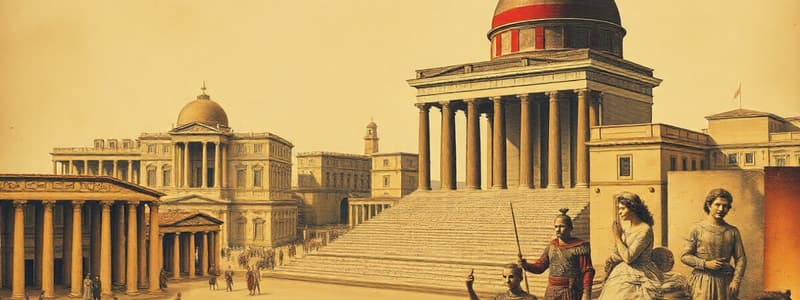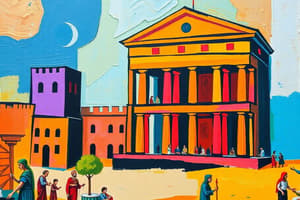Podcast
Questions and Answers
How did Rome's wealthiest citizens exert their influence within the Roman Republic's political system?
How did Rome's wealthiest citizens exert their influence within the Roman Republic's political system?
- By providing free food and entertainment to the poor in exchange for votes. (correct)
- Through strategic alliances with neighboring empires to secure political leverage.
- Through military service and subsequent political appointments.
- By advocating for legal reforms that favored the wealthy elite.
What was the primary factor determining the prosperity and stability of the Roman Empire?
What was the primary factor determining the prosperity and stability of the Roman Empire?
- The strict adherence to democratic principles in governance.
- The consistent expansion of the empire's territories through conquest.
- The size and strength of the Roman military.
- The competence and wisdom of the reigning emperor. (correct)
How did the role and status of women in Roman society compare to that of men?
How did the role and status of women in Roman society compare to that of men?
- Women had more power than men.
- Women held equal political and legal rights as men, participating actively in governance.
- Women were primarily responsible for military leadership.
- Women had fewer rights and less power than men, with limited opportunities for political participation. (correct)
How did Julius Caesar initially gain power, and what event led to his downfall?
How did Julius Caesar initially gain power, and what event led to his downfall?
What was the legal status and treatment of slaves in the Roman Empire?
What was the legal status and treatment of slaves in the Roman Empire?
How did the transition from the Roman Republic to the Roman Empire occur, and what characterized this shift in governance?
How did the transition from the Roman Republic to the Roman Empire occur, and what characterized this shift in governance?
What role did consuls play in the Roman Republic, and why were there typically two consuls serving simultaneously?
What role did consuls play in the Roman Republic, and why were there typically two consuls serving simultaneously?
Beyond domestic duties, what other roles did women hold in the Roman Empire, especially considering the limitations placed upon them?
Beyond domestic duties, what other roles did women hold in the Roman Empire, especially considering the limitations placed upon them?
Flashcards
Roman Men
Roman Men
In the Roman Empire, they held most of the political and legal power.
Roman Women
Roman Women
They had significantly less power than men but could hold roles like priestesses or manage businesses.
Roman Slaves
Roman Slaves
They were prisoners of war who provided most of the labor and had no rights.
Bread and Circuses
Bread and Circuses
Signup and view all the flashcards
Roman Consuls
Roman Consuls
Signup and view all the flashcards
Roman Dictator
Roman Dictator
Signup and view all the flashcards
Roman Empire
Roman Empire
Signup and view all the flashcards
Roman Emperors
Roman Emperors
Signup and view all the flashcards
Study Notes
- Men in the Roman Empire possessed significantly more power and rights compared to women.
- All political and military leaders were men.
- Roman law gave authority and decision-making power to men.
Women
- Women in the Roman Empire had far less power than men.
- Most women did not work but some held important roles like priestesses.
- Some women had jobs in craft shops or bakeries, and a few started their own businesses.
- Women married to military generals or political leaders could gain significant influence, but could never officially hold power.
Slaves
- Millions of slaves existed in the Roman Empire, performing most of the labor in cities and the countryside
- Most slaves were prisoners of war captured by the Romans in various conflicts and sold at slave markets.
- Merchants transported slaves to different cities and provinces.
- Slave owners had complete control over their slaves, with the legal right to subject them to sexual abuse and physical violence.
The Republic
- Democracy in Rome differed from Athens, where all citizens voted.
- Wealthiest citizens effectively bought votes from the poor by offering free food and entertainment ("bread and circuses").
- This "bread and circuses" strategy allowed the richest families to dominate politics.
- The highest-ranking officials were called consuls.
- Two consuls served to prevent one person from gaining too much power.
- Conflicts between the consuls often led to civil wars.
- A dictator was sometimes appointed to restore order.
- Julius Caesar rose to power as a successful military leader and was appointed dictator for life.
- Caesar was assassinated due to rumors that he intended to declare himself king, triggering another civil war.
- Caesar's adopted son emerged victorious, marking the beginning of the Roman Empire.
The Empire
- The strength of the Roman Empire hinged on the competence of the emperor
- Strong and wise emperors led to a thriving empire.
- Weak emperors led to suffering, the fate of the Roman Empire depended entirely on whether the emperor was competent
- Emperors such as Nero and Caligula were known for being insane.
- Weak or incompetent emperors were often assassinated.
- Some emperors ruled for a long time, expanded the empire, or successfully defended it.
Studying That Suits You
Use AI to generate personalized quizzes and flashcards to suit your learning preferences.




